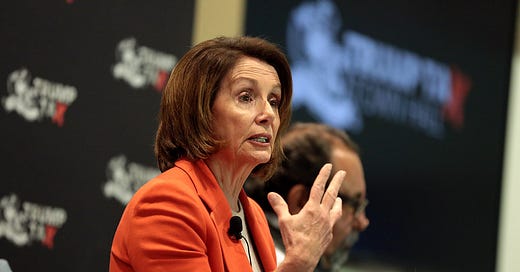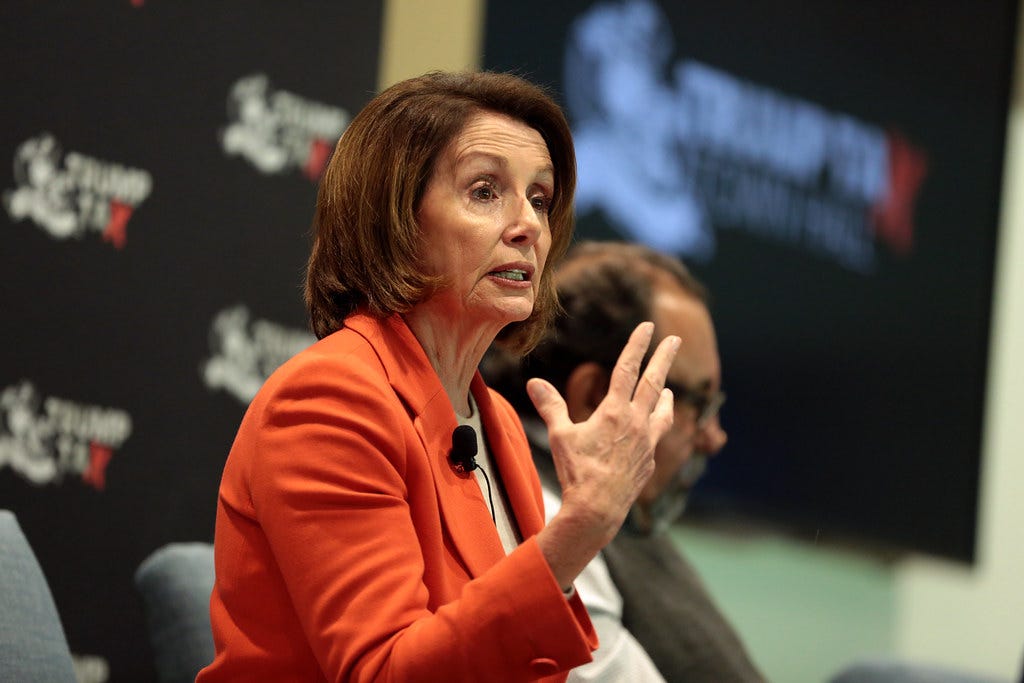Wake Up To Politics - September 27, 2021
Wake Up To Politics: Democrats brace for a “week from hell”
Good morning! It’s Monday, September 27, 2021. Election Day 2022 is 407 days away. Election Day 2024 is 1,135 days away.
Democrats brace for a legislative “week from hell”
Joe Biden harbors dreams of being the next FDR or LBJ. Republicans say he is nothing more than the second coming of Jimmy Carter.
This week could decide which of those paths Biden’s presidency takes: one that succeeds in massively expanding the American social safety net, or one that is undone by a string of external crises.
“The next few days will be a time of intensity,” House Speaker Nancy Pelosi (D-CA) wrote in a letter to her colleagues on Saturday, signaling her intention to usher through a government funding measure, the bipartisan infrastructure package, and the sweeping Democratic spending package all in a single week.
Rep. Debbie Dingell (D-MI) was less diplomatic: “It’s going to be a week from hell,” she told CNN.
What’s at stake
We’ll get to the minutiae of the legislative process in a bit, but first I want to walk through why you should be dialed in to what goes on in Congress this week. So let’s take a look at the massive consequences that could be in store for Biden’s presidency, the Democratic Party, and the American economy.
Let’s face it: Biden badly needs a win. He has been ping-ponging from crisis to crisis in recent weeks, from the chaotic Afghanistan withdrawal to another surge of migrants at the border. The coronavirus pandemic continues to smolder beneath it all.
As American voters grow frustrated with his performance on these and other issues, Biden’s approval rating has sunk to 43%, according to Gallup, worse than any other elected president at this point in their tenure — except his direct predecessor, Donald Trump.

Those worsening poll numbers are beginning to freak Democrats out, especially as the same trends are appearing in polls of competitive House districts and the tightening Virginia gubernatorial election just more than a month away.
Democratic candidates across the country have gone public with their fears that if their leaders in Washington don’t succeed in advancing Biden’s agenda, voters will see very little reason to keep the party in control of Congress after next year’s midterms. As those Democrats see it, how much lawmakers achieve this week will have a direct effect on the course of Biden’s presidency and his party’s electoral fortunes.
But this is not merely political. Although it’s unclear how much will end up in the final package, Democrats are drafting a spending package “that would touch virtually every American’s life,” as the New York Times put it. Among the pieces lawmakers are hoping to stuff in the legislation:
Two years each of pre-K and higher education for every American
An expansion of Medicare to cover dental, hearing, and vision
12 weeks of universal paid family and medical leave
Tax credits for children and for elder care
Initiatives to cut down on greenhouse gas emissions
Higher taxes for corporations and wealthy Americans
And that’s not all. Beyond the spending package, Democrats are also hoping in the next few days to advance a $1 trillion infrastructure package to rebuild America’s roads and bridges, and to pass a bill to stave off a government shutdown and the calamitous prospect of a debt default.
Where things stand
The four legislative priorities that Pelosi laid out can be split into two separate tracks.
Infrastructure + Reconciliation: The fates of the bipartisan infrastructure package and the one-party spending package have been effectively linked by Democratic lawmakers, with moderates pushing for the former and progressives insisting on the latter.
Pelosi had originally promised her moderate members that the bipartisan bill would be put to a vote today, but she announced this weekend that the vote would be pushed to Thursday. The speaker also says the reconciliation package will receive a vote this week, although it’s unclear if it will be ready for passage.
At the very least, she will need to show progressives that Democrats are far enough along on putting the package together — and in a way that can pass the Senate — to convince them to drop their threats of sinking the bipartisan bill.

What’s standing in the way of finalizing the reconciliation package? Here’s just a sampling of the issues Democrats are still fighting out among themselves:
The size of the package: Progressives want $3.5 trillion, centrist Sen. Joe Manchin (D-WV) says he may not support more than $1.5 trillion
Health care: Pelosi wants to shore up Obamacare, Sen. Bernie Sanders (I-VT) is focused on growing Medicare, House Majority Whip Jim Clyburn (D-SC) is calling for expanding Medicaid
Taxes: Biden has called for increases to the corporate and income tax rates, Sen. Kyrsten Sinema (D-AZ) has signaled she might oppose both
Immigration: The Senate parliamentarian ruled that Democrats could not include a pathway to citizenship for undocumented immigrants in the package, but some Hispanic members of the House have said they will vote “no” unless the provision is put back in
All of those differences must be ironed out in the coming days in order to achieve Pelosi’s goal of passing both packages this week, an enormous undertaking. And remember: Democratic leaders have almost no margin for error here. They have three votes to spare in the House, and none in the Senate, meaning any defection can be fatal, so every complaint must be addressed.
Government funding + Debt ceiling: Thursday is also the deadline for Congress to extend government funding; failure to do so will result in a government shutdown. The House passed a bill last week that would avert a shutdown until December, and the Senate will take it up today.
However, the measure is destined to fail in the Senate because it also includes a suspension of the debt ceiling, which Republicans are calling for Democrats to deal with in their reconciliation package instead of on a bipartisan basis.
According to Axios, Democrats’ next move will likely be to offer a “clean” continuing resolution that would extend government funding without lifting the debt ceiling. It’s unclear, however, whether they are willing to address the debt ceiling through reconciliation. If neither party modifies their stance by mid-October, the impact on the economy could be disastrous.
So that’s what you need to know as Congress heads into a uniquely turbulent and consequential week. I’ll be on Capitol Hill today to cover everything going down, and you can be sure to find the latest in Wake Up To Politics all week. Stay tuned!
Policy Roundup: Economics
A weekly briefing by Wake Up To Politics economic contributor Davis Giangiulio.
The Federal Reserve signaled on Wednesday that pandemic-era economic policies could slowly be coming to an end. Federal Reserve Chairman Jay Powell said in a press conference said that “it’s time for us to begin to taper” with the bond purchases the Fed has been making since March 2020 to support the economy. After keeping interest rates low throughout the pandemic, half of Fed policymakers now say they expect to see interest rate hikes coming as soon as next year.
Meanwhile, the Fed has also become more pessimistic about the speed of the economic recovery. The central bank now forecasts that GDP will expand by 5.9 percent this year, compared to their June projection of a 7 percent gain, and that inflation will increase 4.2 percent this year, compared to their 3.4 percent projection in June. However, the Fed still sees the inflation as being transitory from the pandemic, despite lengthening expectations for how long it will last.

As the U.S. continues to fight Covid’s fourth wave, some are worried that the lack of continuing pandemic-era support mechanisms will harm recovery. When Covid hit, the government worked to intervene in the economy to prop it up. But many of the policies that helped in the first three waves are no longer here. The eviction moratorium is no more after a Supreme Court ruling. The expiration of expanded unemployment benefits has left many without extra help, and isn’t necessarily bringing people back to work in big numbers. And even the Fed is slowly pulling back its support for the economy.
With these programs now gone, some fear there isn’t enough holistic support to get through this surge of the virus. “Fall will be slower for all of us because we’ve withdrawn the support,” William Spriggs, a Howard University professor and the chief economist of the AFL-CIO, told the New York Times. “There will be a slowdown in the labor market, and it will be disproportionately Black and brown workers who will have to deal with it.”
There are some bright spots, however: Many parts of the economy, including jobless claims and new jobs figures, continue to slowly improve, even if it’s not as fast as would be preferred.
Daybook
All times Eastern, unless otherwise noted.
EXECUTIVE BRANCH
President Joe Biden will receive his daily intelligence briefing at 10 a.m. He has no other items on his public schedule.
Vice President Kamala Harris will join Biden for his 10 a.m. briefing. At 3:30 p.m., she will host a reception for members of the Congressional Hispanic Caucus in honor of National Hispanic Heritage Month.
White House Press Secretary Jen Psaki will hold her daily press briefing at 1 p.m.
LEGISLATIVE BRANCH
The Senate will convene at 3 p.m. Following Leader remarks, the chamber will resume consideration of H.R. 5305, the House-passed continuing resolution (CR) to extend government funding through December 3 of this year and suspend the debt ceiling through December 16, 2022.
At 5:30 p.m., the Senate will hold a cloture vote on the CR, which will require 60 votes to advance. The measure is expected to fail due to Republican objections to the inclusion of the debt ceiling suspension.
The House will convene at 12 p.m. Following one-minute speeches, the chamber will recess until about 2:30 p.m. The chamber will then reconvene to consider five bills under “suspension of the rules”:
H.R. 1693, the EQUAL Act
H.R. 4981, to amend the Fentanyl Sanctions Act to modify certain deadlines relating to the Commission on Combating Synthetic Opioid Trafficking
H.R. 4250, the War Crimes Rewards Expansion Act
H.R. 1228, the Libya Stabilization Act
H.R. 4686, the Cambodia Democracy Act
The chamber will also begin debate on the Senate amendment to H.R. 3684, the bipartisan infrastructure package, and on the rule setting up consideration of three additional bills:
H.R. 3110, the PUMP for Nursing Mothers Act
H.R. 3992, the POJA Act
H.R. 2119, the Family Violence Prevention and Services Improvement Act
JUDICIAL BRANCH
The Supreme Court is not in session.
Thanks for waking up to politics! If you enjoy reading this newsletter, I’d be so grateful if you’d consider donating to help support me and my work. If you want to show off your support for Wake Up To Politics, you can also buy some merchandise.
Also: don’t forget to tell your friends and family to sign up for the newsletter using your unique referral link. And if you have any questions or comments, feel free to email me at any time.





